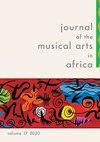Sounding the woods: the significance of gyil music in Dagara funeral ceremonies
IF 0.2
4区 艺术学
0 MUSIC
引用次数: 0
Abstract
Abstract This article examines the musical meaning and role that the gyil (a pentatonic xylophone) plays during Dagara funeral ceremonies in north-west Ghana. It is based on several months of ethnographic fieldwork in the Nandom traditional area in Ghana’s upper western region. Whereas Dagara funerary rituals have undergone transformation over time, gyil music remains a fundamental and essential aspect of them. What then makes gyil music so indispensable in Dagara funerals? This study establishes that gyil music is essential because of its affective nature: the music moves funeral attendants in certain powerful ways – an experience that the Dagara claim cannot be found with any other music. The music propels funeral attendants to express their emotions in culturally acceptable ways, and thus bestows both cultural identity and authenticity on the funeral as a true Dagara event. In this regard, the music is crucial for asserting ‘Dagaraness’ within the current milieu of cultural heterogeneity in contemporary Ghana.聆听森林:吉乐在达加拉葬礼仪式中的意义
本文探讨了音乐的意义和作用,gyil(五声木琴)在达加拉葬礼仪式在加纳西北部发挥。它是基于在加纳上西部地区的南多姆传统地区进行的几个月的民族志田野调查。随着时间的推移,达加拉人的丧葬仪式发生了变化,但吉尔音乐仍然是其中一个基本和重要的方面。那么,是什么让gyil音乐在达加拉人的葬礼上如此不可或缺呢?这项研究表明,gyil音乐是必不可少的,因为它的情感本质:这种音乐以某种强大的方式打动了葬礼上的人——Dagara人声称,这种体验在任何其他音乐中都找不到。音乐促使葬礼参与者以文化上可接受的方式表达他们的情感,从而赋予葬礼作为一个真正的达加拉事件的文化身份和真实性。在这方面,音乐对于在当代加纳文化异质性的当前环境中主张“达加拉内斯”至关重要。
本文章由计算机程序翻译,如有差异,请以英文原文为准。
求助全文
约1分钟内获得全文
求助全文

 求助内容:
求助内容: 应助结果提醒方式:
应助结果提醒方式:


